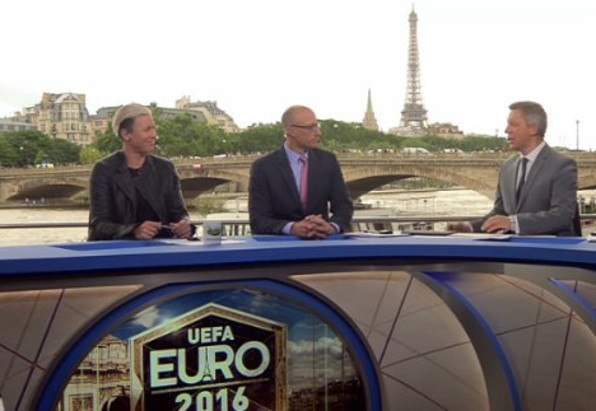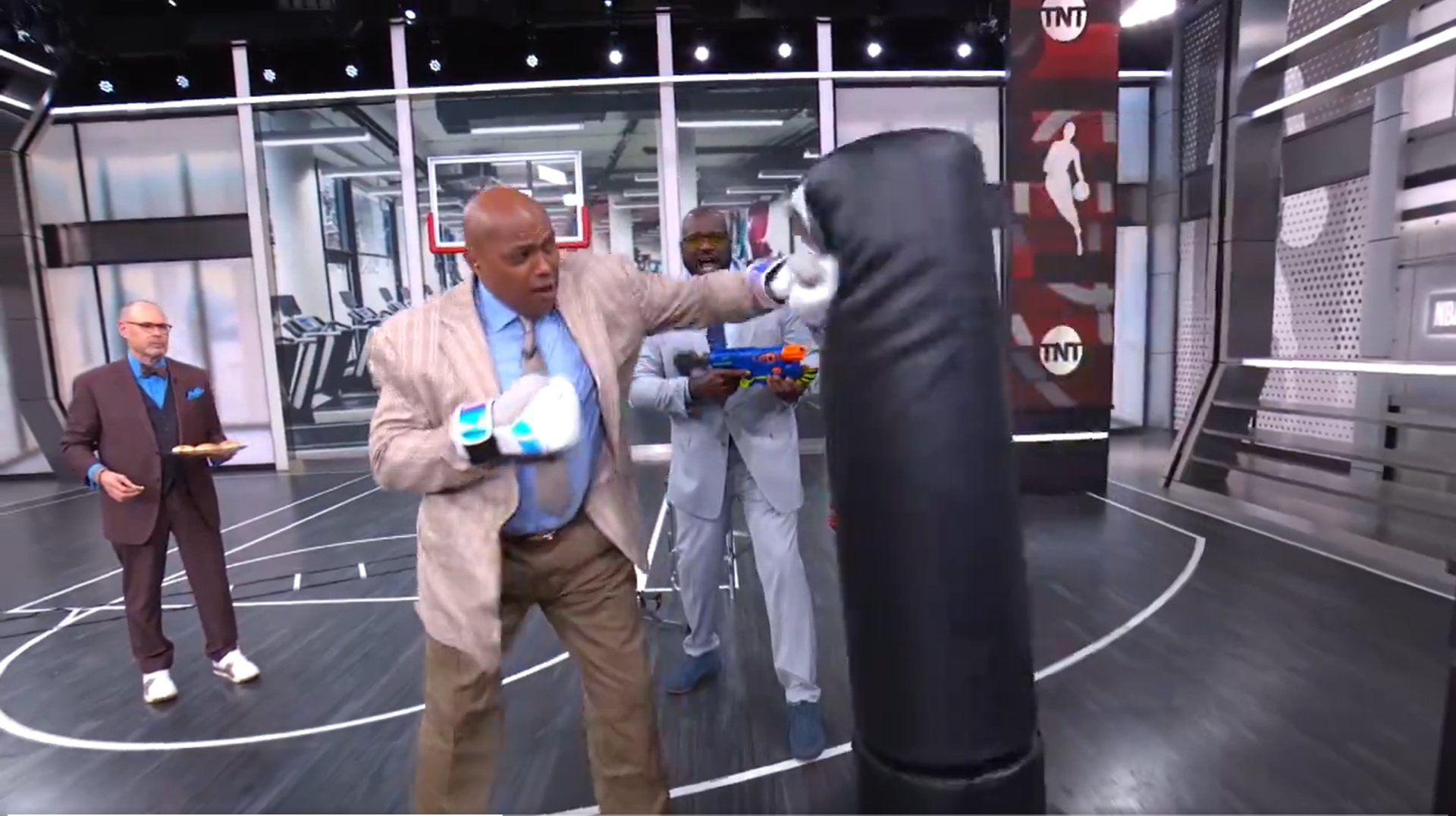Once it was revealed that Fox bought the rights to the FIFA World Cup, ESPN has transitioned their soccer coverage to make the UEFA European Championship their top tournament. And they showed that over the past month, sparing no expense in sending reporters all over France as well as the world.
ESPN’s Euro 2016 coverage wasn’t anything new or unexpected but it was the kind of high quality soccer coverage that fans have come to expect from the Worldwide Leader.
The coverage wasn’t exactly smooth sailing either, as flooding caused ESPN to move their set from the banks of the river Seine to a temporary enclosed set that wasn’t as glamorous. Some complained about a weird effect when the people on set were in front of an obvious green screen but it’s probably not fair to criticize ESPN too harshly for this. This was a temporary emergency, and ESPN did the best they could do in an unfortunate and unavoidable situation.
One misstep that occurred during ESPN’s coverage happened on the first day of the tournament. Earlier that day, starting Spanish goalkeeper David de Gea was accused of rape. Naturally, since he was playing at the Euros, De Gea would be talked about. While host Bob Ley did his best to keep the discussion on the more serious topic of the rape accusation, former Everton manager Roberto Martinez and former England international Steve McManaman kept trying to steer the conversation toward how it would effect De Gea and the Spanish team when that really wasn’t the most important thing to discuss at that time. It caused a slightly uncomfortable feel for the viewer as Martinez and McManaman kept trying to frame the discussion on soccer while the experienced Outside the Lines host was trying to be fair and keep discussion on the serious crime that De Gea was accused of.
After day one, it seemed ESPN was getting into the groove. One great thing they did was they had a large number of hosts and analysts cycling in and out each day. Let’s face it, the European Championship is a long month of soccer. It’s 51 matches that all take place within a month. While I’m sure everyone on set at ESPN has the knowledge to talk about every match, giving everyone a break from being on set helps as they can focus on specific matches to study and dedicate more time on them instead of having to be on set everyday potentially going off the seat of your pants talking about the upcoming matches knowing you have to do the same tomorrow. This causes a more in-depth conversation on each match that’s beneficial for the viewer. Also, if there is a certain analyst that you don’t much care for, you don’t have to see them on TV every day and that may make your viewing experience a bit more pleasurable.
Also early on in the tournament, we saw the debut of USWNT legend Abby Wambach as an analyst for ESPN. I wasn’t particularly impressed with Wambach’s analysis, but it was her first time so it’s not unrealistic to believe that she can and will improve. Wambach seemed to rely more on clichés and generalized statements that didn’t have much substance. Wambach wasn’t the first analyst to speak in clichés, and she definitely won’t be the last, so there’s certainly room for improvement. It definitely seemed like she had the knowledge to be a great analyst, it’s just explaining that to the audience. It’s a common issue when athletes transition to the TV side of the sport and if Wambach works on it, there should be no issues in future years.
As the tournament was happening, one unexpected story was the emergence of Iceland in the Euro 2016 tournament. Whether you were talking about their small size, their passionate announcers or their dedicated fans, Iceland was the talk of the tournament. Knowing that and since almost everyone in Iceland was watching the Euros, ESPN sent someone to Iceland. First, Jeremy Schaap went to the country, and then after he flew to France, Marty Smith went to Reykjavik. It wasn’t necessary for ESPN to do that because they could have just put a camera on the crowd as the people watched and celebrated their team, but ESPN went the extra mile and gave viewers the full experience.
ESPN’s coverage of the Euro Final between France and Portugal was near perfect. Ian Darke was at his usual greatness but I was much more impressed with Taylor Twellman.
There was a time where I didn’t much care for Twellman’s commentary. Years ago, I used to dread hearing Twellman on the call for a match because he seemed to solely have a different opinion just to be a contrarian. At times, Twellman would try to joke around with his broadcast partner, usually winding up in an awkward situation. A few years ago, I began to warm up to Twellman’s commentary and appreciated how he was able to use his unique experiences to shape his commentary style. We all know Twellman is a huge proponent of concussion research and having an organized protocol in how to treat concussions during a match, and he isn’t shy on expressing that view on the broadcast. When your playing career was prematurely ended by concussions, it’s not unexpected to have that be a big part of your life, especially when there was a time where he was talking about concussions when hardly anyone else in TV would.
Anyway, when Cristiano Ronaldo got injured in the eighth minute, it would have been very easy to be cynical and believe that Ronaldo was trying to exaggerate the foul to try and get Dimitri Payet a yellow card. From the start, Twellman felt there was something wrong with Ronaldo and kept his eye on him. When Ronaldo went down again, people realized that this was more serious but Twellman was on top of things before everyone else realized. Throughout the most crucial part of the Euro 2016 Final, Twellman made all the right moves, said all the right things, and told viewers exactly what they needed to hear to understand the situation. For his first major tournament final as a color commentator to be covering Cristiano Ronaldo getting injured, Twellman handled it perfectly.
Twellman’s analysis on Ronaldo’s injury was also important because he could only do that if he and Darke were actually in the Stade de France. Because it can cut production costs, many sports networks are debating whether or not to send commentators to the events or keep them at their studios to call the game from a monitor. It is an easy cost cut at a time where networks are tightening their budgets but if Darke and Twellman had called the Euro 2016 Final from Bristol, Twellman probably never would’ve known there was something serious with Ronaldo. When calling the game from a monitor, the commentators are literally seeing the same thing the viewer is seeing and all we saw were clips of the foul and Ronaldo on the ground. We didn’t get to see Ronaldo limp on after being fouled and because Twellman was at the stadium, he got an enhanced vantage point and was able to tell us what we couldn’t see because the world feed wasn’t providing that to us. In the debate of broadcasting a match from a studio or at the stadium, it may cost more but in times like this, calling a match from the stadium can pay off and enhance the broadcast.
So while Euro 2016 as a tournament wasn’t that great, ESPN’s Euro 2016 coverage was top notch. It wasn’t perfect at all times, and ESPN will note that as they continue with their MLS and U.S. Soccer coverage until the Euros start again in 2020. Given the next Euros will be played throughout Europe, it will be very interesting to see how ESPN handles that in four years time.








Comments are closed.